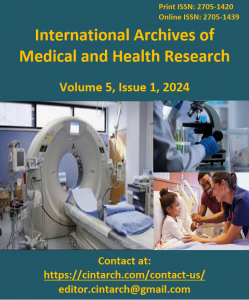
International Archives of Medical and Health Research (IAMHR), pISSN: 2705-1420; eISSN: 2705-1439
July to September 2024 Vol 5(1): pp.1-8 DOI: https://doi.org/10.33515/iamhr/2024.006/01
Copyright © 2024 C-International Archives
Original Article
Perceptions and factors influencing the acceptance of family planning among women of reproductive age in Sokoto metropolis, Nigeria
Ifeanyi J. Nkwoka*, Uma Mubarak
Department of Community Health, Usmanu Danfodiyo University, Sokoto, Nigeria
*Corresponding Author’s Email: ifynkwok2000@gmail.com
Published October 31, 2024
ABSTRACT
Background: Family planning is essential for reproductive health, helping to reduce maternal and child mortality and improve family well-being. Understanding perceptions and factors influencing its acceptance among women of reproductive age is crucial, particularly in northern Nigeria, where cultural and religious beliefs strongly shape health behaviors. Aim: This study aimed to assess the perceptions and factors influencing the acceptance of family planning among women of reproductive age in Sokoto metropolis, Nigeria. Materials and Methods: A cross-sectional survey was conducted among 265 women aged 15-49 years, selected using a multi-stage sampling technique. Data were collected through structured questionnaires focusing on socio-demographic characteristics, perceptions of family planning, and its acceptance. Descriptive statistics and chi-square tests were used for data analysis. Results: The majority (93.6%) of respondents were aware of family planning, with 83.1% perceiving it as safe. However, about half (50.4%) believed their religion was against it, and 17.4% considered it difficult to use. A third of respondents (35.5%) currently use a modern family planning method, with a significantly (p < 0.001) higher acceptance among older women (30-49 years), married women, and employed respondents. Implanon (41.5%) and condoms (22.3%) were the most commonly used methods. Conclusion: This study reveals a promising acceptance of family planning among women of reproductive age in Sokoto metropolis, Nigeria. Acceptance is significantly higher among older, married, and employed women, while some expressed some misconceptions. Public health interventions are required to address misconceptions and empower women to make informed reproductive choices, enhancing overall community health and economic resilience.
Keywords: Family planning, perceptions, acceptance, influencing factors, women of reproductive age

